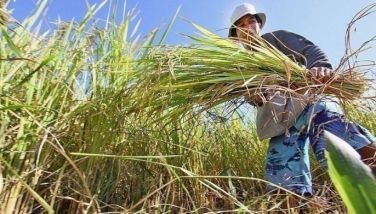Campaign mobilizes youth for climate change solutions
MANILA, Philippines - A campaign that mobilizes the youth to engage in agriculture was tapped by an international project to mold high school students as potential supporters in helping rice farmers adapt to climate change. 


The Program on Climate Change, Agriculture, and Food Security of the CGIAR partnered with Sagot ko ang magulang ko campaign to “develop an instructional module that will incorporate climate change as a component of major agriculture subjects in technical-vocational schools.†Philippine Rice Research Institute (PhilRice) of the Department of Agriculture, leads the campaign. 


The joint project, development and roll out of climate smart rice farming module in the infomediary campaign-participating schools in the Philippines aims to involve students in information dissemination on climate change mitigation and adaptation measures in rice farming. 


Campaign lead Jaime A. Manalo IV said the initiative to develop the teaching module will technically prepare the students to be competent in providing climate change information to their parent-farmers and the farming sector. 


“Mainstreaming climate change in the curriculum is a good way to start. We hope that the teaching modules developed through this project will complement the world’s effort in healing our environment,†Manalo said.


Baseline study on high school students’ knowledge and understanding on climate change in relation to agriculture confirms that the youth are aware of the threats that it can bring to food production, particularly on rice. 


Results from about 500 students showed that high school students perceived climate change as a phenomenon. 


Most of the surveyed students associated climate change to weather-related occurrences such as increase in temperature, drought, and floods or typhoons. 


Students also named TV, radio, and the print media as their primary sources of climate change information.


“With the increased media mileage on sensationalizing climate change as the mother of all disasters, it is not surprising that the children are, in one way or another, familiar with it. Relating it to rice production may, however, be a different issue,†Manalo said.


Manalo’s team also recorded the students’ observation on the effects of climate change to rice farming activities and the corresponding changes in rice farming practices.
Students considered extreme dryness of the land as the most observable change happening in the rice field. 


Meanwhile, they identified water management as the most crucial production component with climate change in the picture. With the observations, however, students are keen that rice yield is negatively affected.


“We have ascertained that students know and understand climate change in their own terms. However, their knowledge may still be enriched as majority of what they know are just based on their immediate surroundings, personal experiences, and general overview as provided in a small portion of their Science class,†Manalo said. (DA-PhilRice Development Communication Division)
- Latest
























